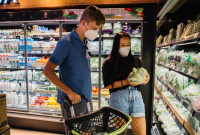Support strong Canadian climate journalism for 2025
Several major plastic manufacturers have turned to the courts to stop the federal government from implementing a ban on several single-use plastic items.
Canada's $29-billion plastics industry is already suing the government over listing plastic as toxic under the Canadian Environmental Protection Act, Canada's main environmental law. The new lawsuit aims to prevent the government from implementing the ban and allow the continued sale of banned items.
"It's consistent with the plastics industry's deep fear and loathing around the idea that governments would actually ban some of these completely unnecessary and polluting items," said Environmental Defense executive director Tim Gray.
Single-use plastics typically can't be recycled, making them a major source of plastic pollution worldwide. The materials are also poised to become a major climate problem in coming years, with oil and gas companies banking on the materials making up the majority of their future growth as the world moves away from fossil fuels. Without more stringent regulations on disposable plastic production, the amount being used and discarded is projected to triple by 2060.
The federal measures ban the sale of plastic checkout bags, cutlery, straws, takeout containers, beverage ring carriers, stir sticks and straws, with the goal of phasing them out entirely by the end of next year. The move comes after years of environmental studies and consultations that concluded the ban was both environmentally beneficial and has significant support from Canadians.
Canada's plastics industry has fought the government's plans with a months-long lobbying campaign exposed by Canada's National Observer. When those efforts were largely unsuccessful, the industry turned to lawsuits in an effort to overturn the ban and other measures to tackle plastic pollution.
The most recent lawsuit is an "escalation" to delay the ban until a future government that is friendlier to industry demands is elected, said Gray.
The legal documents for the most recent suit were filed by a coalition of major plastic manufacturers, including DOW and NOVA Chemicals, and two smaller plastic packaging companies based in Ontario and Oregon. None responded to a request for comment by deadline.
Environment and Climate Change Canada also did not respond to a request for comment by deadline.






Comments
Makes me despise plastic products even more!
It's sad that corporations, companies and far too many individuals even have to have legislation brought in to limit their plastic manufacturing and use.
These lawsuits will go nowhere, but cost taxpayer money to defend against.
May the plastic industry disappear quickly and with only the whimper of their pathetic lawsuits.
There were only a few days of inconvenience where I forgot to bring a cloth shopping bag with me to stores, but overall my family has adjusted to no more general use plastic bags, save the ones individual veggies are placed in. No big deal.
The remaining plastic bags and films need to be made biodegradable by law. But that still leaves the mountains of plastic jugs and housing for electronics, which are mostly shipped overseas where recycling is questionable. Canada, its provinces and cities should deal with its own waste at home and create jobs in the process. Step One would be to vastly reduce the amount of plastic entering the economy in the first place.
There are many grades of cardboard and layered paper wraps, containers and bags laminated with a moisture-resistant corn starch-based liner that can pick up much of the slack, even in fast food joints. We keep our kitchen waste in a sealed laminated paper bag in the fridge until it's full, then toss it into the green bin. No mess, no flies, no stink. The neighbour tosses everything unsealed and loose into their green bin in the same side yard and flies and smells are always a problem.
I guess the thing for me is that there is plastic, and there is also the fact that our forests are disappearing. Paper comes from trees. I remember when it was considered to be the ecologically friendly thing to use a plastic shopping bag, and save the trees.
Not plastic, but related in terms of environmental pollution measures, back in the 60s, in Vancouver one could readily buy phosphate-free detergent at the supermarket. It was called, if memory serves, "Vancouver Only."
(And I'll be using plastic bags probably for the rest of my life, because I've saved so many over time, specifically to be re-used, that it'll take that long to use them up.)